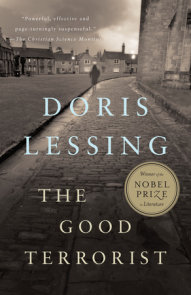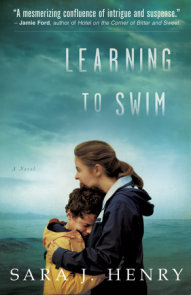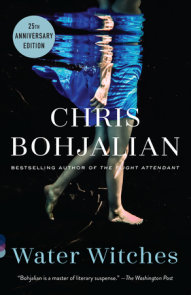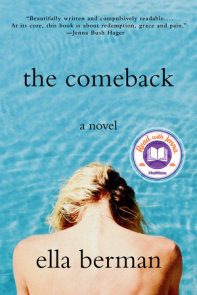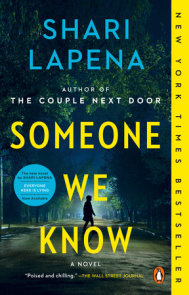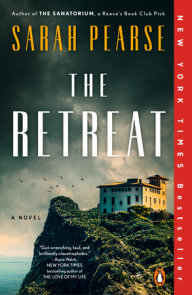READERS GUIDE
Questions and Topics for Discussion
INTRODUCTION
On a summer afternoon in a Melbourne suburb, friends, family, and neighbors gather at Hector and Aisha’s home for a backyard barbecue. The children play together while the adults drink beer, sample Hector’s mother’s Greek specialties, and debate school systems. As the lazy hours while away, tensions mount: Disagreements and longstanding differences flare between guests. The children quarrel over toys and videos. Hector is on edge waiting for his teenage mistress to arrive and takes some speed with a friend of a friend. Then Hugo, the wayward child of Aisha’s childhood friend Rosie, throws a tantrum. Hector’s cousin Harry, trying to protect his own child from Hugo’s violent outburst, slaps him. The stunned silence of the onlookers is only the first sign of the shock and outrage that ripples through the community.
The following chapters, each told from the point of view of one of the barbecue guests, depict what happens next. Police are called to the scene. Rosie and her husband Gary press charges despite Harry’s and Hector’s urgings to settle it between the families. Harry, a wealthy businessman, hires a well–connected lawyer to represent him, while his working–class accusers, increasingly embittered and seeking justice, end up with a court–appointed attorney. On trial are not just the slap and the moral question of whether any adult is ever justified in hitting a child, but also the values and lifestyle choices of the accusers, who live in public housing and still breastfeed their three–year–old. In the days leading up to the trial, Hector’s family and Aisha’s friends start taking sides, pressing the already strained marriage to a crisis point and endangering the goodwill of everyone involved.
In the meantime, Hector’s teenage paramour Connie and her gay best friend Richie, who both babysit for the troubled child, find themselves wrapped up in the case—and the adult concerns surrounding it—in ways they hadn’t anticipated.
With unflinching insight and ambitious scope, Tsiolkas’s novel sympathetically delves into the underbelly of middle–class suburban life, exploring the drug use, racism, extramarital lust, domestic violence, alcoholism, and crippling jealousy that plague his intersecting cast of characters. Tsiolkas effortlessly slips in and out of their widely varying perspectives, laying bare their most difficult truths. Brutal and compelling, The Slapportrays a world where the natural human yearning for safety and security is always threatened by a darker current of destruction and desire.
ABOUT CHRISTOS TSIOLKAS
Christos Tsiolkas is the author of Loaded, which was made into the feature film Head–On; The Jesus Man; and Dead Europe, which won the 2006 Age Fiction Prize and the 2006 Melbourne Best Writing Award. The Slap was short–listed for the Miles Franklin Award and won the Commonwealth Writers Prize, the Australian Literary Society’s Gold Medal. Tsiolkas is also a playwright, essayist, and screenwriter. He lives in Melbourne.
A CONVERSATION WITH CHRISTOS TSIOLKAS
Q. This book revolves around a central, powerful incident: the titular slap. How did you settle on this as your subject? Was it always clear to you that you would tell the story with this particular structure, using a prism of different perspectives?
It was the structure that came first. I knew that I wanted to write a contemporary novel, a novel that was about my city and my culture as we all live now. I wanted to write about class and gender, about ethnicity and place, and I knew that I needed a structure that would allow for multiple voices, that would allow for differing perspectives. One of my favorite films of all time is the Japanese classic Rashamon, directed by Akira Kurosawa. That film is set in medieval Japan and retells the story of a rape through five different perspectives. It is a film that challenges us to ask questions about the nature of truth. It struck me that our contemporary age is characterized by contested notions of authenticity, that we live in a pluralist world where we are very aware that our gender, race, and sexuality play a large part in how we interpret the world. The structure of having multiple voices allowed me to reflect, through the writing, something of what it is like to live in our world now.
Part of what attracted me to such a structure was the challenge of wondering if I could pull it off, as a writer, to have a narrative told through eight different voices, to see if I could maintain a reader’s attention across those eight voices. It kept the writing process interesting, kept me on my toes.
So the structure came first, and some of the characters, but the actual incident of “the slap” came from something I witnessed at a barbecue held by my parents. It was not dissimilar from the barbecue that is described at the beginning of The Slap. My parents had invited friends and family to a big barbecue. At one point the four–year–old son of a close friend was playing in the kitchen while my mother was very busy cooking, baking, preparing an astonishing amount of food: there were the meats, two chickens in the oven, there were spinach pies, roast vegetables, and endless salads. The little boy was playing on the floor, opening and shutting cupboards, and my mother kept ordering him to stop. At one point he opened a cupboard and two or three pots and pans fell to the floor. My mother, harassed, took hold of him and very lightly, softly, patted him on the bum. “Jack”, she said, “I said stop!” What I will never forget is Jack’s look of shock at what had happened. Just as I have Hugo say in the book, he turned to my mother, placed his hands on his hips and said, “No one has the right to touch my body without my permission.”
To which my mother replied, “If you are naughty, I will smack you.”
Now, I want to make sure it is understood that there was no violence in what my mother did. It was the softest of pats on his backside, the boy’s mother was there, and we all laughed. The incident was promptly forgotten and we all continued having a grand day at the barbecue.
But driving home that evening my thoughts went back to the incident and I remember thinking of the world of difference between the young boy’s experience of life and that of my mother’s. She is a migrant from Greece, who was raised in that terrible period of Greek history where she experienced both the Nazi Occupation and the horrifying civil war that tore Greece apart after the cessation of World War II. She grew up in a culture where she was denied education because she was a woman, a culture where she was beaten if she as much as dared look askance at a man. Then there is the young boy’s experience of growing up in a postmodern world where his godfather is a gay man and where he has a sense of rights owed to him even before he starts school.
It felt like a gift, having observed the incident I described above. I knew I had the beginning of my book, that it would start at a Melbourne barbecue, and that it would involve an adult who slapped a child who was not his own. It is such a simple idea but I knew it would allow me to explore questions of family and honor, questions of cultural shift and cultural change.
The very next day I started writing the book.
Q. This book has been characterized as a portrait of Australia’s new middle class. For the benefit of American readers, can you describe what distinguishes Australia’s “new” middle class from the older one, and why this segment of the population interested you?
One of my frustrations with much of Australian literature has been how it still represented a homogenous Anglo–Celtic culture that did not tally with my experience of growing up in a city such as Melbourne. After World War II, Australia undertook a period of mass industrialization that resulted in a doubling of its population and the coming into the country of hundreds of thousands of migrants initially from southern Europe, and then increasingly from Asia and the Middle East, which profoundly changed the makeup of the population. The children and grandchildren of these immigrants are now middle class, we are now Australia’s business people, teachers, writers, artists, and filmmakers. I wanted to write a novel that gave voice to this experience.
When I have traveled in the United States I find many things I recognize there: a sense of the possibility of the “new world,” the ubiquity of the open road, the divorce of class identification from lineage. For such reasons (and also because of the music!) I feel more at home in the United States than I do in Europe.
However there are three main differences between the Australian and the American experience I want to outline because I think they are important for understanding the book.
First, we never had a revolution and so our colonial ties to Great Britain have never been severed. That means for a long time Australians understood their destiny as inexorably linked to that of “Mother England,” and the Anglo–Celtic nature of Australian society was assumed. One of the first acts of the Australian parliament in 1901 (previous to this Australia consisted of a half dozen colonies of Great Britain) was the White Australia Policy, which limited migration to the country to English speaking “whites,” i.e. northern Europeans. It was not until after the end of World War II that non–Western Europeans were allowed entry into the country and the act itself was not officially abolished till 1972. My generation is the first one in this country that does not feel an allegiance to Britain, that sees itself as much Greek or Vietnamese as it does “English.” This is a profound change in Australian identity and it is only till very recently that our art is beginning to reflect such changes.
Second, having traveled through the United States, the fact that Australia was never a slave colony means that we have subtly different ways of understanding race and racial oppression from the Americans. African Australians are people who have come from Africa or whose parents were migrants or refugees from Africa, largely over the last two decades. We did not have the tragedy of the Atlantic slave trade and so “color” is not as much an issue in terms of Australian racism as is the question of “ethnicity,” i.e. cultural background.
We never had slavery on this continent but we did have the transportation of large classes of British and Irish “convicts” to Australia, and while I was growing up the big divide for an older Australian generation was between those whose heritage was “convict” and those who could draw a line back to being “free settlers.” However, with the coming of people to Australia from across the world, from southern Europe, Asia, and Africa, this historic legacy is felt less keenly now than it was when I was growing up.
Third, and I think most important, the most vexing and difficult political question for us Australians is the continual dispossession of the Aboriginal people from their land and culture. No other issue more troubles our nation and it is the reason why so many of our great works of art have been attempts to deal with this history. It is one of the reasons why I wanted to have Bilal’s voice in the book, someone whose very history is about the tragedy of genocide and dispossession. A “slap” is delivered to every character in the book, and for me, the most important “slap” is the one Bilal delivers Rosie in her chapter when he tells her he wants her to have nothing to do with his family, that her people are “no good.” It is a provocative moment, particularly as it is delivered to an Anglo woman by an indigenous man. One of the continuing tragedies of our ongoing inability to heal the wounds of racism here in Australia is that too many indigenous youths are destroyed by alcohol and drugs. Bilal has found, through Islam, a means of transcending the violence of such a past. That too is a provocative choice but I think faithful to an experience, and possibly one Americans can recognize from their own history of racism.
Q. The geography of Melbourne and its various neighborhoods plays an important role in this book—in some cases, almost defining the characters and their social status. Do you view geography as a kind of social destiny?
Melbourne is my city—I know it, understand it, I fall in and out of love with it. I know from my own experience as a reader that there is a real pleasure that comes from having a writer give you as “sense of the world”. One of my favorite writers is Carson McCullers and, though I have never been to the southern United States, I feel like I know it from The Heart Is a Lonely Hunter. I think it is important as a writer to not forget what we have learned as readers. Readers are willing to be introduced to a city or a place as a character, to discover its neighborhoods, geography, sights, and smells through the power of words.
Do I think that geography is social destiny? I don’t think that we are necessarily bound by geography but we are shaped by it. The Slap is a novel about the middle class and one of the things that defines the new middle class is gentrification. Melbourne was a very industrial city, its inner neighborhoods were migrant and working–class until only very recently. I wanted to have characters reflect on the changes in their city, and I hope that through such reflections a reader anywhere in the world can identify with how physical space is as much a marker of memory as is family, as is love and desire.
Q. The middle class world of The Slap is very insular, with the adults mainly focusing on their own children, careers, and homes, and yet the outside world—race and gender and sexual identity struggles, politics, history—seeps in, almost despite the characters’ self–centeredness. A reader could potentially find a sly commentary in there. Do you think these characters would be more psychologically evolved or even happier if they were more directly engaged with bigger issues?
The novel was written at a time when Australian culture was the richest it has ever been, where we were the wealthiest we had ever been. Concurrent with the rise of such wealth was a growing sense of entitlement. It seemed to me that over the last two decades Australians have become more selfish, that a myth we told ourselves about being an “egalitarian” people was being displaced by a belief that it was “every man and woman for themselves.” Growing up I never heard the word “loser” being used, it was just not something we said to one another, even in the schoolyard. Now I hear that word everywhere. I probably would question how true the old myths were, but undoubtedly I believe that we have grown more selfish in our culture.
I am a man who wants to think of political questions. I am also very aware of the possibilities and opportunities that I have, that come from the struggles of feminists, civil rights activists, from many committed individuals in history who suffered to allow me to live as an openly gay man. I feel I want, in my life, to honor that history. I am often shamed by how I fall short of that goal.
I think the sense of entitlement that so many people now have is corrosive. It does create selfish communities, selfish marriages, selfish families. I am also equally wary of a self–righteousness that I find in many of my peers, and I fear that I see it too often in myself. It was very important in writing the book that I was honest about the lies we tell ourselves, the many small and big compromises we make in order to not be challenged or to not have our comfort disturbed. I fear that our present culture is not a brave one but I wanted to be honest about my own shortcoming as a man. I have felt shame, I have betrayed people I love, I have hurt people out of spite and selfishness. I wanted to be honest about my generation and the only way I found I could do that was to be as honest a writer as I could.
My own favorite character in the book is the old man Manolis. Not that he isn’t racist, not that he isn’t misogynist, not that he hasn’t made and continues to make mistakes. But he does not have that sense of entitlement that I see in so much of my generation; he does not have that self–righteousness. He knows there is a bigger world out there than himself. I think many of us have forgotten that.
I should say I detest reading books in which characters are defined solely as “good” or as “evil,” where contradiction and doubt and complexity are erased, where it is assumed that we always know what is correct or right behavior. Those kinds of books make me want to drown myself in whiskey just to rid myself of the stench of both entitlement and righteousness. I am too polite to name names but I’d prefer to read the cheapest porn, the most commercial potboiler, rather than spend time in those narrow, politically correct worlds. Those books stink of the worst of the contemporary middle class.
Q. An interesting element of your narrative structure is that these very disparate and sometimes at–odds characters tend to view one another very similarly. For instance, there’s a widely held consensus that Hector is vain, Harry is violent, and Gary is a drunk. Are you suggesting that there are certain universal truths about people?
I came of age in a literary culture where the “universal” was something to be suspicious of, and to be “relativist” was considered a more appropriate response or attitude to take. I understand this thinking. Of course I do, this is why I have chosen the structure that I have in the novel, to have the narrative be taken up by eight different characters, to have the reader constantly have to shift their identification, to have to question their conclusions.
But given all that, yes, I do believe in the reality of universal truth, that there are experiences that can be understood across time and space. The films I love, the books I adore, the paintings and music that mean the most to me, they all prove this.
I hope I will not be seen as being evasive if I answer that, yes, I do think that there are universal truths about people but that I want the reader to question the “universal truth” assumed for each character by the other characters in the book. I am not being deliberately cryptic here. But one of my intentions in writing the novel was to have the reader ask precisely such a question, to have to weigh how the “truth” of each character is unsettled when we hear their voice, or see something through their eyes.
I will speak now as a reader rather than as a writer. I know that the best books, the books I love most or unsettle me, upset me, disturb me the most, touch something of the universal even when the particulars of narrative, characters, place, and time have nothing to do ostensibly with the geography and biography of my own life. For readers and writers to reject the universal is to betray the very possibility of fiction.
Q. Rosie, with her indulgent parenting, self–righteousness, and inability to confront reality, is perhaps the least likable of all of the characters here, yet you manage to evoke the reader’s sympathies once we can finally step into her point of view. How, as a writer, do you manage to make a difficult and flawed character sympathetic?
If I assumed that readers were only interested in characters that were sympathetic, then I might as well give up writing. It is the challenge of writing to get into the minds and consciousness of difficult characters, to try to understand the “strangeness” of other lives.
Rosie represents the worst of the self–obsession, the entitlement and self–righteousness I associate with my own generation. But I think it is that I see those traits in myself that allow me to try and imagine her world, her thinking, her confusion, her determination.
I think that if a writer is faithful to an experience, then that is one way that you can allow a reader to enter the consciousness of even the most difficult of characters.
When it comes to Rosie, I have been surprised at how visceral the hate directed toward her can be. I shouldn’t have been surprised. It has been one of the things that have most disturbed me over the last twenty years, how excoriating people can be about mothers, and how often other parents can be the worst culprits. I wonder if the violent responses regarding Rosie are not telling of our own confusions and fears about parenthood, about how we are raising our children, our nieces and nephews.
I did not have a chapter in Rosie’s voice for the first few drafts of The Slap and I knew it was my being fearful. Her voice was essential in this book. I was resisting writing in her voice because she was exactly the kind of person I derided, one of those people I cursed and dismissed. So when I came to writing in her voice I had to do what I did with all the characters, I had to find an element of my own experience that could serve as a guide. Just as with Harry, I had to interrogate my own instinct for aggression and violence, and just as with Hector I had to admit to my own narcissism, with Rosie I had to explore my own need to have everything to appear “nice,” to not want to admit to the truth of how fucked one’s life can be. That was my way in because it is also one of the things I most detest about myself: my self–delusion and my social cowardice.
I should say that it was a way in, not an endpoint. That aspect of Rosie is something I share, but in other ways she is such a very different character from me. I would hate to think people thought that the characters are just eight different personas of the writer. If I can’t use my imagination to create characters outside myself, then I have no business being a writer.
Also, and very importantly, Rosie loves Hugo. I wanted that to be clear, I wanted to make sure that there was no doubt in the reader’s mind about that.
Q. Throughout the book, sexual desire—particularly Connie’s, Hector’s, Richie’s, and Aisha’s—drives your characters to do irrational and sometimes ugly things. It’s only when the smoke clears and the desire dissipates that they can begin to make better choices. As a plot device, does desire always have to be destructive?
I don’t think there are any firm rules about anything in fiction. So no, desire doesn’t always have to be destructive. But, of course, it is often more interesting and more dangerous when it is.
As I have stated above, The Slap is a novel about the contemporary middle class. One of the defining things about this class is that it has been forged in part by the struggles of feminism and the changes around sexuality and sexual freedom. I am a product of those struggles and those changes and I am grateful for that. But such struggles and such changes don’t come without cost and I wanted to be faithful to that experience as well. It seems to me that we shroud much of our talk about family, sex, sexuality, children, love, the whole damn thing, in a rhetoric drawn from gender and sexual politics that too often denies complexity, or reduces human relationships to a contest between victor and victim. I know in my own life that monogamy is hard, that you do betray loved ones and that becoming adult is in part learning to live with the shame of such betrayals. Adolescents have sexuality, women and men have a different relationship with parenting and with biology, sex can be liberating and intoxicating; it can also be destructive and toxic. I wanted each chapter of The Slap to strip away the lies we tell ourselves, to peel away the falseness of much of the rhetoric in our heads.
It is part of how I hope the book works: that it is about getting to the core of a sense of truth and authenticity but recognizing how difficult that process is. That there is never finally an endpoint that it is continual, ongoing: that process is part of being in a long–term relationship, in a marriage, in being someone’s parent and in being someone’s child.
Q. Richie hovers outside much of the action of the book as an outsider character, yet the slap, we later find in the final chapter, probably affects him most dramatically. Why did you choose to end the book with him?
I wanted to end with Richie because he is, as we say here in Oz, a good bloke. I am not being facetious, I mean that seriously. I don’t know if it happens as much in the United States, though I suspect it does, but here in Australia there is a demonization of young people as thuggish, destructive, self–involved, and narcissistic. And if they are not being demonized, then they are being cast in the role of perpetual victims. With Connie and with Richie I wanted to create two decent people who love each other, who, whatever their failures and mistakes, can negotiate a multiracial, multicultural, and sexually fluid world in a way their parents’ generation could not. I know I can be harsh about my generation and I wanted to end on a chapter that suggested that we were not always doomed to selfishness and narcissism. It was also important for me that Richie was the child of a single mother and that he was a functional, good bloke from that background. The notion that everyone from a single–parent home is screwed up is a damn conservative lie.
One thing I am constantly surprised about when people discuss the book is how they don’t talk of the second slap: that is when Tracey, Richie’s mother, slaps him in the final chapter. Maybe it is because whether people like or don’t like the book, if they get that far they know that Tracey loves her son, that it is a slap that comes from a human moment of betrayal, disappointment, and fear and it is something that she quickly apologizes for. This is how it differs from the slap Harry gives Hugo at the beginning of the book. I very consciously bookended the book with both “slaps.”
I also ended with Richie because I wanted to suggest how the selfishness of much of our contemporary lives impacts on children around us. Aisha, Hector, Gary, Rosie, they are all too selfish to see how young people are responding to and interpreting their behavior. That is probably the most damning thing about my generation: we don’t take any responsibility for the consequences of our behavior. I think Manolis does and I hope Connie and Richie will in their futures.
This is a biographical note, and it doesn’t really matter to any reader of the book, but Richie is also a little like how I remember my partner, Wayne, when I met him twenty–seven years ago. He, like Richie, is a good bloke (and a cartographer, hence Richie’s love of maps).
Q. Did some of the consequences of the slap surprise you in the writing process, or did you come to the table having already plotted out all of its ripple effects?
I begin with structure, then sculpt and form the characters, and from then on it is all surprise. I can only speak for myself, but if it weren’t for how the writing continues to always surprise me I don’t think I could keep going. That isn’t to say there isn’t craft and there isn’t work there. Learning to be a writer is learning to be the craftsperson; it is exactly like an apprenticeship but it lasts a lifetime. And part of learning the craft is the sitting down at the desk and putting the hours in.
But the surprise is crucial. Writing is the yellow brick road and the highway to hell and the magic carpet ride and the long and winding road and the stairway to heaven. It has to be all these things, it always has to astonish you—what characters do, where the story goes. If you are not being surprised you are being bored and if you bore yourself you are going to bore your reader.
Q. The family unit is challenged here by so many different forces—friendships, parenting styles, cultural assimilation—and yet by the novel’s end all of the families remain intact. Are they yoked together out of a fundamental connection, blind loyalty, or both?
I think both and a lot more. Though the majority of the relationships in The Slap are based on the traditional heterosexual marriage I hope that reading between the lines one can see that a parallel world is
visible and possible: Anouk’s choices; the family that is Connie and her aunt; the loving non–monogamous marriage of Connie’s bisexual parents; the single–parent family that Richie was raised in. But whatever the relationship and the nature of the family, the question of how to sustain a relationship, how to remain loyal to love is a crucial one. I think it is crucial whatever your sexuality, whatever your identity and your class; it is crucial whether you are a parent or an aunt or uncle.
There is connection, there is blind loyalty, there is shared history; there is also fear, there is inertia. But there is also love and the leap of faith.
DISCUSSION QUESTIONS










